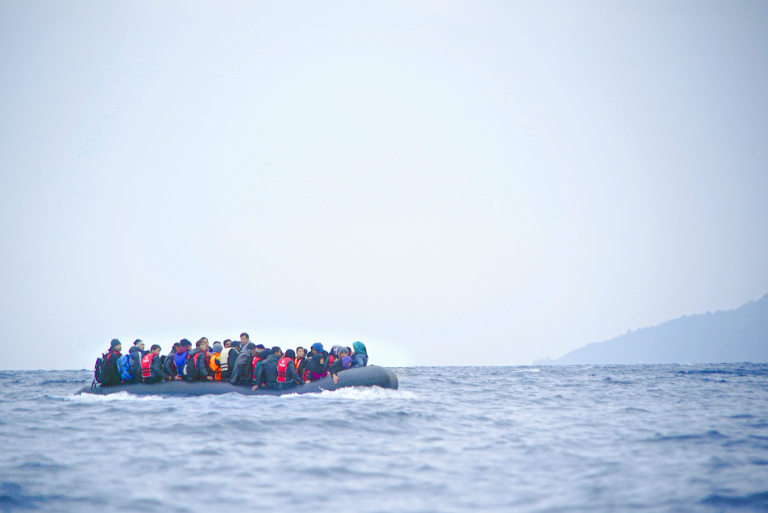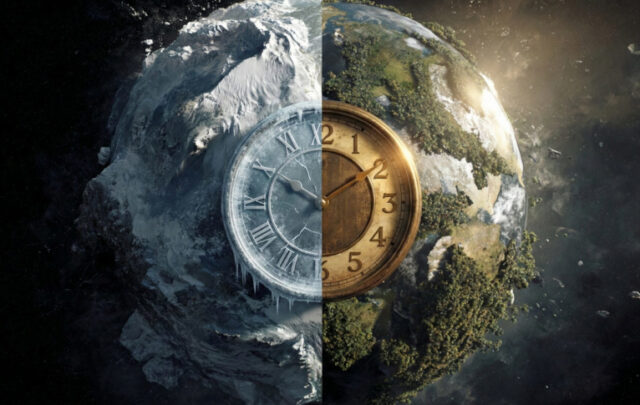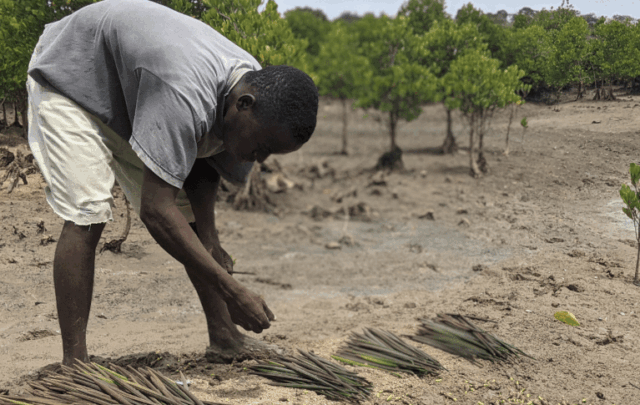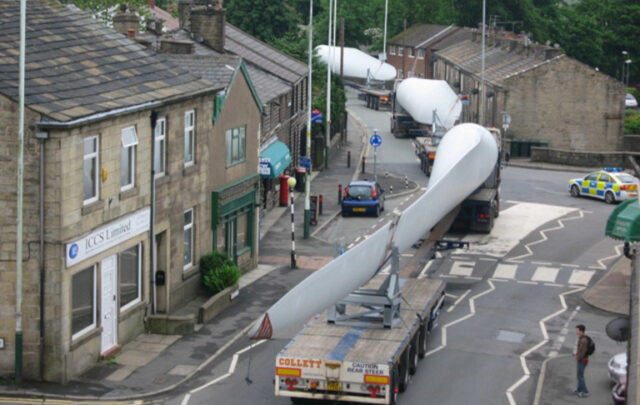On 7 February 2022, Arizona’s attorney general, Mark Brnovich, released a legal opinion that declared that the refugees trying to cross the heavily fortified US–Mexico border constituted an ‘invasion’ by drug and smuggling cartels, allowing the state’s governor to invoke ‘war powers’ and send the National Guard to defend its 650-kilometre border. The state’s governor, Doug Ducey, who already frequently deploys the National Guard on the border and has increased funding for border enforcement, argued his state was already defending its border effectively. There are signs, however, Republican activists are latching onto the demand for war powers against refugees as they did with Trump’s rallying cry on the border wall.
The case raises questions both not only about public attitudes towards migration but also the direction of policy responses, particularly in the context of rising displacement caused by climate breakdown. Essentially, people who have been forced to leave their home and who need help are met not by emergency health workers but by armed guards who treat them like ‘invaders’. Why have military means become the default response to social crises, leaving aside geopolitical conflagrations such as the Russian invasion of Ukraine, or the forgotten wars in Syria or Yemen? The world is used to treating US politics like a warped outlier, but when the UK’s Home Secretary Priti Patel is proposing using the British Navy to return asylum seekers to France, and Greek coastguards are found to have deliberately left refugees to drown, it is clear that the trend towards militarising the control of migration is expanding apace everywhere.
[slide-anything id=’3472166′]
The treatment of refugees and migrants as enemies – and the appeal to use military means to combat them – represents the most visible manifestation of militarised climate adaptation, but it is not the only form it takes. Many political leaders, such as President Biden and European Commission President Ursula von der Leyen, also cite the likelihood of increased conflict and state instability in low-income countries as more reasons to ready their military and security apparatus to deal with climate impacts. The varied warnings are united by a framing that considers the victims of climate change as the West’s principal ‘threats’.
Policing the crisis
This framing is based on a long history, embedded in colonial structures that carved up the world into ‘civilised’ populations, who needed protection, and ‘barbarians’ to be repressed or killed. The framing has since evolved, most recently in the national security strategies of some of the world’s richest countries. While the richest and historically most polluting countries failed to prevent or mitigate against climate change (most recently in the rightly labelled #blahblahblah COP26 summit), they were financing their armed forces to develop expensive far-reaching plans on how to adapt to climate change.
These security strategies include the US 2007 seminal report, Age of Consequences: The Foreign Policy and National Security Implications of Global Climate Change, the 2016 White Paper on German Security Policy and the Future of the Bundeswehr, and most recently the 2021 NATO Climate Change and Security Action Plan.
Notably, all these plans are dominated by the perceived ‘threat’ of mass migration. A 2008 EU report Climate change and international security listed climate-induced migration as the fourth most significant security concern (after resourced-based conflicts, economic damage to cities and coastlines, and territorial disputes). It called for ‘further development of a comprehensive European migration policy’ in light of ‘environmentally-triggered additional migratory stress’.
These warnings have bolstered the forces and dynamics in favour of militarisation of borders that, even before climate-related warnings, had come to dominate border policies worldwide. In Europe, there are more than 1,200 km of border walls, mostly built since 2015. And walls are springing up everywhere: there are now 63 worldwide. Global military spending has similarly doubled since the end of the Cold War.
Almost none of this spending seeks to protect or support migrants, let alone address the reasons why people would migrate in often deadly and dangerous circumstances. The EU’s maritime missions in the Mediterranean, for example, have cut any commitment to rescue migrants and, in effect, now seek mainly to force refugees to return to North Africa. A TNI report, the Global Climate Wall, shows that the richest countries are now spending at least twice as much on borders and controlling immigration than on climate finance. In the case of the US, it is 11 times as much. In other words, rather than investing in providing finance to low- and middle-income countries to support those who are displaced so that they can rebuild their lives, the richest countries are choosing instead to invest in making migration increasingly dangerous and deadly.
It is articulated by many European, US and Australian politicians in the language of deterrence – the idea that making migration as dangerous as possible will somehow stop it happening. But all it does of course is just make migration even more deadly. People who are desperate will take unimaginable risks. This politics of deterrence has consequently turned the Mediterranean into Europe’s graveyard, where 23,499 people are known to have died since 2014 with many more unrecorded. As this process unfolds day after day, it is normalising the death of the victims of climate change. It is normalising what Achille Mbembe, the Cameroonian philosopher and public intellectual, has called ‘necropolitics’ in which ‘the political order is reconstituting itself as a form of organization for death’, overwhelmingly of Black and Brown people.
Security for the few
The question remains of why security strategies have come to determine most approaches to dealing with a crisis for which they are ill-equipped and cannot hope to solve. The latest report of the Intergovernmental Panel on Climate Change (IPCC), published in February 2022, and represents the best scientific assessment and consensus, is unequivocal that the climate crisis and its impacts will be mostly caused by ‘patterns of intersecting socio-economic development, unsustainable ocean and land use, inequity, marginalization, historical and ongoing patterns of inequity such as colonialism, and governance’. In other words, to reduce and adapt to the impacts of climate breakdown and its consequences, the economic and governance systems need to be radically transformed. The armed forces or border guards cannot offer any solution – on the contrary, their role is precisely to uphold the unjust status quo.
The reasons are multiple but can be largely be captured in what Martin Luther King described as the ‘the three evils of society’, namely, the ‘giant triplets of racism, economic exploitation and militarism’. Racism is deeply embedded in the politics of security, which assumes without question that some lives deserve security and others do not – or, worse still, that the security of a minority requires making others less secure. It is often deliberately mobilised, using a racialised fear of the ‘other’ to distract people from focusing on the real actors responsible for injustice. But as a powerful cultural force, this is often unconscious, as the Ukraine crisis has shown, where some of the governments that have been most hostile to migrants have suddenly opened their borders and provided free train travel and accommodation to Ukrainian refugees. ‘These are not the refugees we are used to… these people are Europeans’, said Bulgarian Prime Minister Kiril Petkov, with absolutely no sense of shame. Similar opinions have been parroted by many governments and media commentators.
The industry of militarisation
The causal role of economic exploitation behind militarised adaptation to climate breakdown lies at the heart of the issue precisely because it is intrinsic to capitalism, which externalises any costs to people and nature in order to fuel profits and growth. And the inequities capitalism causes also need to be policed – even more so when the root causes of exploitation are not addressed, leading to resistance, revolt or conflict. As the US ‘liberal’ media commentator, Thomas Friedman put it, ‘The hidden hand of the market will never work without a hidden fist. McDonald’s cannot flourish without McDonnell Douglas… And the hidden fist that keeps the world safe for Silicon Valley’s technologies to flourish is called the U.S. Army, Air Force, Navy and Marine Corps’. This approach has led to annual increases in US spending on military, homeland security and borders, with a marked escalation since the 2001 terrorist attacks in New York and on the Pentagon. Similarly in Europe, even in the midst of austerity since the mid-2000s, military and security spending has consistently risen. The EU’s border guard agency Frontex had its budget increased from €5.2 million in 2005 to €460 million in 2020 with a further €5.6 billion to be allocated between 2021 and 2027. And the EU is now gearing up through the European Defence Fund (EDF) to allocate €8 billion to fund military research and development (R&D), more than it has set aside to address COVID-19 (€5.3 billion).
Behind all this lies an industry that both drives and profits from increased militarisation. In Europe, the arms and security industry has embedded itself deeply into the corridors of Brussels, winning research contracts, participating in high-level security roundtables, hobnobbing with politicians at arms fairs, and lobbying for legislation from which they can benefit. Many of the defence industry’s proposals, such as its push to set up a cross-European border security agency – Frontex/European Border and Coastguard Agency (EBCG) eventually ended up as policy. Companies such as Accenture Airbus, G4S, GEO Group, Leonardo, Thales, and Unisys have boomed, winning contracts, shaping policy, and pushing a narrative that there can never be enough ‘security’.
In the midst of the Russian invasion of Ukraine, these dynamics are unfortunately set to deepen as the conflict pushes countries to turn once again to the military and defence industry for solutions. The unprecedented decision, for example, by Germany to increase its military budget to €100 billion ($112.7 billion) over five years, and committing to reach the 2% of gross domestic product (GDP) spending on defence in line with NATO members, has implications well beyond the current conflict, as it will also shape how Germany (and other countries rapidly militarising) respond to the climate crisis. If the only institutions in which governments invest in coming years are the military and security apparatus, it will hardly be surprising when they become the default institutions to address climate instability.
Dead ends
Yet it is clear that military and security options are never solutions to a climate crisis caused by corporate greed and systemic injustice. There is no nationalist solution to a climate crisis where carbon emissions and global heating know no borders. Militarised adaptation to climate breakdown is akin, as US journalist Christian Parenti argues, to the politics of the ‘armed lifeboat’ that seeks to secure the wealth of the few while training guns on everyone else. In the end, by failing to tackle the root causes of the climate crisis, even the armed lifeboat is likely to sink. The recent IPCC report points to another path, arguing that tackling ‘patterns of inequity’, providing finance to climate-affected countries and communities, and supporting peace-building efforts, are the most effective forms of ‘climate-resilient development’. Its conclusions make clear that building an economy based on climate justice means dismantling the war economy. This requires greater alliances and cooperation between today’s climate movements, peace movements as well as those movements seeking to demilitarise and desecuritise our communities and nations, such as the Movement for Black Lives. No Justice, No Peace.
Teaser photo credit: By Mstyslav Chernov/Unframe – Own work, CC BY-SA 4.0, https://commons.wikimedia.org/w/index.php?curid=46776361























